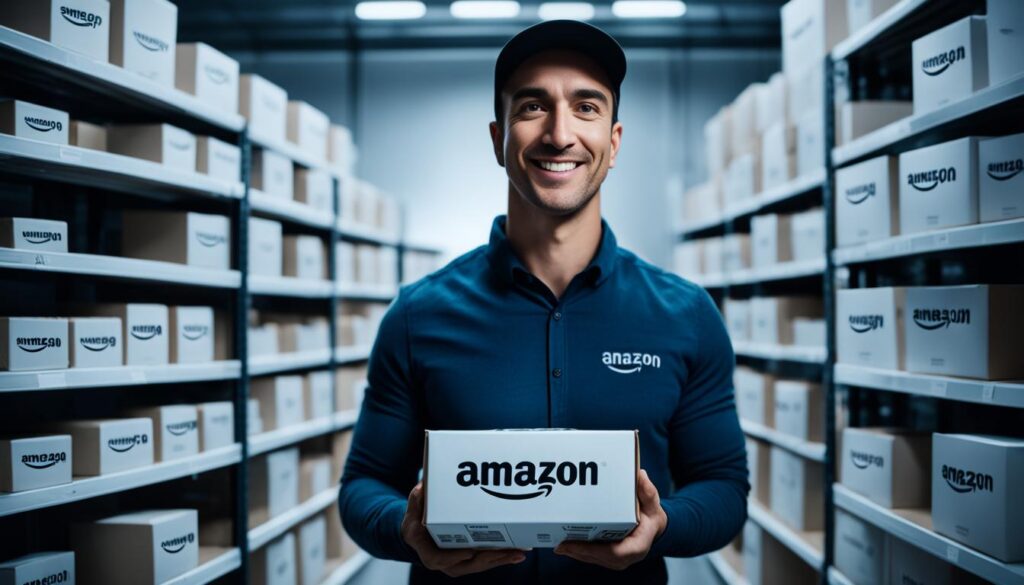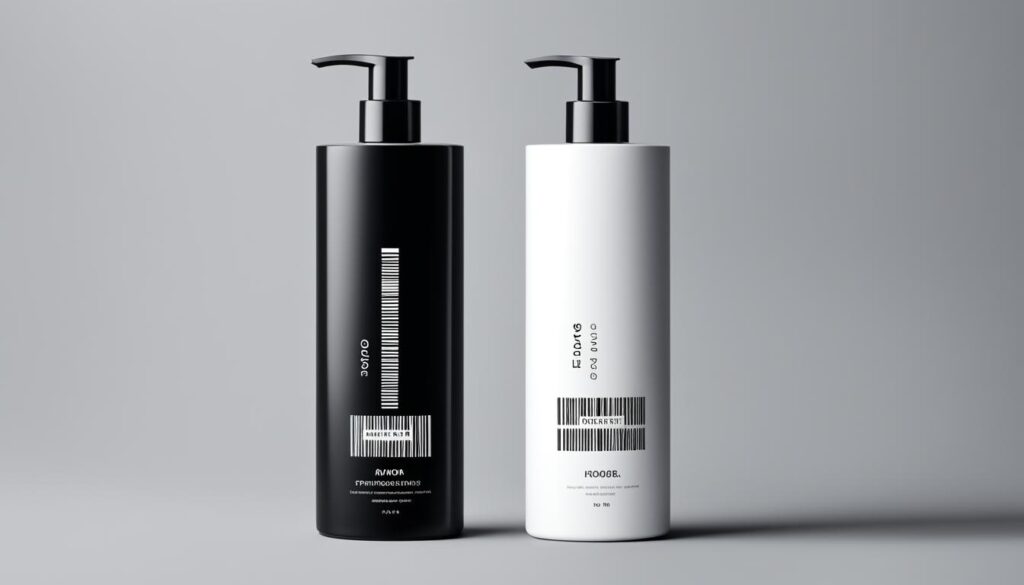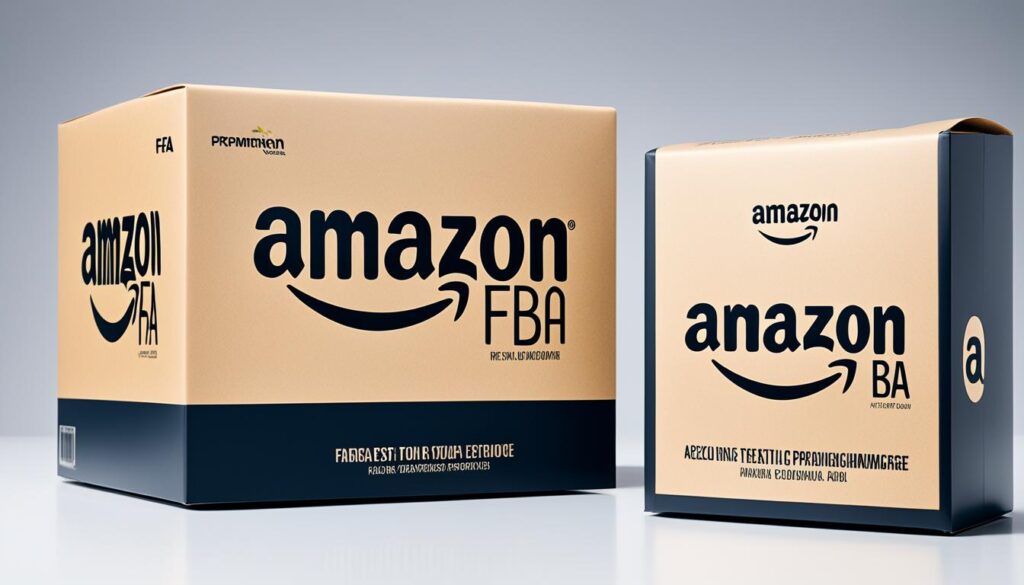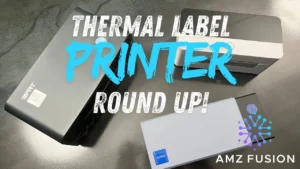Launching your own private label brand on Amazon is a highly lucrative business model, with 54% of Amazon sellers using this approach. By selling Amazon FBA private label products, you can create a unique brand, have full control over pricing and branding, and enjoy higher profit margins. With the right strategies and techniques, you can build a successful private label business on Amazon.
Key Takeaways:
- Private label products are goods manufactured by one company but sold under another company’s brand.
- Selling private label products on Amazon offers brand ownership, higher profit margins, and creative control.
- To sell private label products on Amazon, conduct product research, find a supplier, create an optimized listing, choose a fulfillment method, and implement effective marketing strategies.
- Examples of successful private label products on Amazon include Amazon Basics, Jungle Creations, and Anker.
- Setting up an Amazon seller account is the first step in starting your private label journey.
What Are Amazon Private Label Products?
Amazon private label products refer to goods that are manufactured by one company but sold under another company’s brand. This practice, known as private labeling, allows businesses to put their own branding twist on existing products in the market. By leveraging existing products, private labeling enables you to create a unique brand without the need to reinvent the wheel or develop a completely new product concept.
Private labeling is a common strategy employed by big retailers to offer their customers a diverse range of products under their unique brand. With private labeling, you have the opportunity to customize the product through branding, allowing it to stand out from similar products in the marketplace.
Branding plays a crucial role in private labeling, as it helps you forge a unique identity for your brand. By developing effective brand development strategies, you can create a strong and recognizable brand that resonates with your target audience.
Manufacturers play a key role in the private labeling process. They produce the goods according to your specifications, ensuring that the product meets your desired quality standards. It is important to choose reliable and reputable manufacturers to ensure the consistent quality of your private label products.
In summary, Amazon private label products offer businesses the opportunity to create their unique brand by putting their own branding twist on existing products. Through effective branding and collaboration with manufacturers, businesses can develop a successful private label product line and differentiate themselves in the market.
| Features | Affordability | Customization | Branding |
|---|---|---|---|
| Private Label Products | Competitively priced | Customizable through branding | Opportunity to build a unique brand |
| Existing Products | Varied price range | Standardized features | Branded by the original manufacturer |
Source: SEOWriting.ai.
Why Sell Private Label Products on Amazon?
Selling private label products on Amazon offers numerous advantages for aspiring entrepreneurs. Let’s explore the key reasons why you should consider this business model:
- Brand Ownership: When you sell private label products, you have complete ownership of the brand. This gives you the freedom to market, grow, and price your products as you see fit. You have full control over your brand’s image, positioning, and long-term strategy. Use Brand Registry to claim your brand on Amazon.
- Higher Profit Margins: By sourcing private label products directly from manufacturers or suppliers, you can eliminate middlemen and enjoy higher profit margins. Without the added costs associated with wholesalers or distributors, you have the opportunity to maximize your earnings.
- Customize Your Product: Private label products provide you with the opportunity to customize and differentiate your offerings. You can add unique features, enhancements, or packaging to make your products stand out from the competition. This customization allows you to create a distinct brand identity and attract a dedicated customer base.
- Creative Control: As a private label seller on Amazon, you have creative control over your product listings. You can easily edit images, pricing, copy, and keywords to optimize your listing’s visibility and conversion rates. This flexibility empowers you to constantly refine and improve your product pages.
- No Competition for Buy Box: The Buy Box is a coveted feature on Amazon that significantly impacts sales. As a private label seller, you have a competitive advantage because you are the sole seller on your listing. This means you have exclusive ownership of the Buy Box, leading to higher visibility and conversions.
Selling private label products on Amazon allows you to build your own brand, maximize profit margins, differentiate your products, exercise creative control, and dominate the Buy Box. The combination of these factors creates a compelling business opportunity for entrepreneurs looking to succeed in e-commerce.
Stay tuned for the next section where we’ll discuss how to successfully sell private label products on Amazon.
How to Sell Private Label Products on Amazon
To sell private label products on Amazon and maximize your success, it is crucial to follow a strategic approach. Here are the key steps to take:
1. Conduct Product Research
Prioritize product research to find a profitable and low-competition product that meets market demand. Utilize tools like Jungle Scout or Helium 10 to analyze sales data and identify emerging trends. Consider factors such as customer reviews, sales rank, and keyword search volume to make informed decisions.
2. Find a Reliable Supplier
Look for reliable suppliers, preferably from China, through platforms like Alibaba or Global Sources. Thoroughly vet potential suppliers by reviewing their product quality, certifications, and customer feedback. Establish a good relationship, negotiate pricing and terms, and ensure clear communication channels for seamless collaboration.
3. Create an Optimized Amazon Listing
Develop a compelling Amazon listing by considering essential elements. Include professional product photography that showcases the benefits and features of your private label product. Set competitive pricing to attract customers. Craft unique product titles and descriptions that highlight the distinct value your product offers. Optimize your listing with relevant keywords to improve search visibility and organic rankings.
4. Choose Your Fulfillment Method
Decide whether to utilize Fulfillment by Merchant (FBM) or Fulfillment by Amazon (FBA) as your fulfillment method. FBM allows you to handle shipping and customer service independently, while FBA provides convenience and scalability by leveraging Amazon’s fulfillment network. Assess the size of your business, inventory needs, and budget to make an informed decision.
5. Launch Your Product and Implement Marketing Strategies
When launching your private label product, establish a comprehensive marketing strategy. Utilize product promotions and Amazon advertising to drive initial sales and increase visibility. Leverage social media platforms and influencer collaborations to generate buzz and attract potential customers. Continuously optimize your marketing efforts based on customer feedback and market trends.
6. Monitor and Optimize
Regularly monitor your product’s performance and gather customer insights. Pay attention to customer reviews and ratings, as they provide valuable feedback for optimizing your private label product. Continuously refine your marketing strategies and make data-driven decisions to improve sales and achieve long-term success on Amazon.
By following these steps, you can navigate the process of selling private label products on Amazon, increase your chances of success, and establish a profitable private label brand.

Examples of Private Label Products on Amazon
When it comes to private label products on Amazon, there are numerous success stories that demonstrate the potential for building a profitable brand. Let’s take a look at a few notable examples:
Amazon Basics
One of the most well-known and widely successful private label brands on Amazon is Amazon Basics. This brand offers a diverse range of high-quality products at affordable prices, ranging from electronics and home essentials to office supplies and kitchenware. With its reliable reputation and extensive product line, Amazon Basics has garnered a loyal customer base and continues to thrive in various categories.
Jungle Creations
Jungle Creations is another prime example of a successful private label brand on Amazon. This brand made its mark by introducing innovative products with a focus on sustainability and functionality. Their washable pee pads for pets are a perfect example of a unique private label product that meets a specific consumer need. Jungle Creations emphasizes professional-quality images and infographics to enhance product appeal and effectively communicate their value proposition.
Anker
Anker is a private label brand known for its range of electronic accessories, including chargers, cables, and portable power banks. With competitive prices and a strong emphasis on quality and customer satisfaction, Anker has earned a reputable position in the market. Their success on Amazon is attributed to their ability to offer reliable and affordable alternatives to well-established brands.
These examples demonstrate that private label products can achieve significant success on Amazon when coupled with effective branding, quality products, and competitive pricing. Each brand has carved its own niche and leveraged the platform’s reach to connect with customers and drive sales.
| Private Label Brand | Product Category | Key Success Factors |
|---|---|---|
| Amazon Basics | Various categories | Affordable prices, extensive product line, reliable reputation |
| Jungle Creations | Pet supplies | Unique product offerings, professional-quality visuals, sustainability focus |
| Anker | Electronic accessories | Competitive pricing, quality products, customer satisfaction |
Setting Up Your Amazon Seller Account
Before you can start selling on Amazon, you need to set up an Amazon seller account. There are two types of accounts available: an individual seller account and a professional seller account.
Individual Seller Account:
An individual seller account is free to set up. However, you will be charged a commission fee for each sale you make. This account type is suitable if you plan on selling fewer than 40 products and don’t require access to restricted categories.
Professional Seller Account:
If you intend to sell more than 40 products or want to access restricted categories, it is recommended to sign up for a professional seller account. This account costs $39.99 per month, but it offers additional benefits and tools to help you grow your business on Amazon.
When choosing the account type, consider the number of products you plan to sell and whether you need access to restricted categories. Selecting the right account type is crucial for maximizing your selling potential on Amazon.
| Account Type | Features | Cost |
|---|---|---|
| Individual Seller Account | Commission-based fees per sale No access to restricted categories |
Free |
| Professional Seller Account | Additional selling tools and benefits Access to restricted categories |
$39.99/month |
Finding a Profitable Private Label Product
Finding a profitable private label product is a crucial step in building a successful Amazon FBA business. It requires thorough product research and analysis to identify opportunities with high demand, low competition, and the potential for high-profit margins.
Researching Amazon Best Sellers
One effective way to start your product research is by exploring Amazon Best Sellers. This list showcases the top-selling products across various categories, giving you valuable insights into current market trends and popular items. Pay attention to product categories that align with your interests and expertise.
Utilizing Product Research Tools
Product research tools like Jungle Scout and Helium 10 can be incredibly helpful in identifying profitable private label products. These tools provide data on sales trends, customer demand, and competition analysis. You can leverage this information to make informed decisions about which products to pursue.
Assessing Market Trends and Customer Feedback
Market trends play a significant role in product selection. Analyze emerging trends, seasonal demands, and changes in consumer preferences. Additionally, take into account customer feedback by reading product reviews and identifying potential areas for improvement or product differentiation.
Conducting Competition Analysis
Competition analysis is crucial to understanding the competitive landscape and evaluating the viability of your product. Analyze the top competitors in your target niche, assess their pricing, product features, and customer reviews. Identify gaps in the market that you can leverage to differentiate your private label product.
Validating Your Product Idea
After narrowing down your product options, it’s essential to validate your product idea. This involves assessing market demand, conducting keyword research, and evaluating the overall feasibility of your product. Ensure that there is enough demand to support your business goals.
| Key Factors to Consider | Product Research Tools to Use |
|---|---|
| Market trends and customer preferences | Jungle Scout |
| Competition analysis | Helium 10 |
| Sales data and demand | Amazon Best Sellers |
By leveraging these product research strategies and tools, you can find a profitable private label product that aligns with market trends, customer demand, and your business goals.

Sourcing Your Private Label Products
When it comes to sourcing private label products, it’s important to find reputable suppliers who can meet your requirements. Here are some strategies to help you find the right suppliers and ensure product quality:
Researching Suppliers
Start by researching suppliers on platforms like Alibaba and Global Sources. Look for suppliers with a good reputation, positive reviews, and experience manufacturing similar products. These platforms provide a wide range of options for you to explore and compare.
Attending Trade Shows
Consider attending trade shows such as the Canton Fair, where you can meet suppliers in person and establish direct connections. This allows you to assess their manufacturing capabilities, product quality, and build a personal relationship with them.
Using Jungle Scout Supplier Database
Utilize the Jungle Scout supplier database to find factories your competitors are using. This can help you identify reliable suppliers who have already proven their ability to deliver quality products.
Evaluating Suppliers
When evaluating suppliers, consider factors such as their manufacturing capabilities, pricing, lead times, and minimum order quantities. It’s also important to establish clear communication channels to ensure effective collaboration.
Negotiating Pricing and Terms
When you’ve selected a potential supplier, negotiate pricing and terms to secure the best deal possible. Be prepared to discuss factors such as bulk discounts, payment terms, and any additional services or customization options you require.
Implementing Quality Control
To ensure the quality of your private label products, implement a robust quality control process. This may involve performing inspections, testing samples, and setting clear quality standards to meet your customers’ expectations.
By sourcing your private label products from reliable suppliers and implementing quality control measures, you can ensure that your products meet the highest standards and provide value to your customers.
| Key Steps | Details |
|---|---|
| Research Suppliers | Explore Alibaba and Global Sources platforms |
| Attend Trade Shows | Participate in the Canton Fair |
| Utilize Jungle Scout Supplier Database | Find factories your competitors are using |
| Evaluate Suppliers | Assess manufacturing capabilities, pricing, lead times, and minimum order quantities |
| Negotiate Pricing and Terms | Secure the best deal possible |
| Implement Quality Control | Perform inspections and set clear quality standards |
Creating an Optimized Amazon Listing
Creating an optimized Amazon listing is a crucial step in ensuring the success of your private label product. By incorporating key elements such as professional product photography, competitive pricing, unique product title and description, relevant keywords, infographics, and videos, you can attract more customers and drive sales to your listing.
Professional Product Photography
Investing in high-quality, professional product photography is essential for creating a visually appealing listing. Clear, well-lit images that showcase your product from multiple angles help potential customers get a better understanding of its features and benefits. Include lifestyle images that demonstrate the product in use, as this can help customers envision themselves using it.
Competitive Pricing
Pricing your private label product competitively is crucial for attracting customers and standing out from the competition. Research similar products on the market to determine the average price range. Consider your production costs, profit margins, and market demand when setting a competitive price that appeals to your target audience.
Unique Product Title and Description
Your product title and description should be unique and engaging, capturing the attention of potential customers. Use descriptive language to highlight the key features, benefits, and unique selling points of your product. Incorporate relevant keywords naturally throughout the content to improve search visibility and rankings.
Relevant Keywords
Strategically incorporating relevant keywords in your listing can help improve its visibility in Amazon’s search results. Conduct keyword research to identify the most popular and relevant keywords in your product niche. Include these keywords in your product title, bullet points, and product description to increase your chances of being discovered by potential customers.
Infographics and Videos
Infographics and videos are powerful tools for showcasing your product’s features and benefits. Infographics can effectively communicate information and data in a visually appealing format, making it easier for customers to understand your product’s value proposition. Videos provide an immersive experience and allow customers to see your product in action. Utilize these visual elements to enhance your listing and captivate potential customers.
By optimizing your Amazon listing with professional product photography, competitive pricing, a unique product title and description, relevant keywords, infographics, and videos, you can increase your chances of attracting customers and driving sales to your private label product.
Choosing Your Fulfillment Method
When it comes to selling your private label products on Amazon, choosing the right fulfillment method is crucial. You have two options to consider: Fulfillment by Merchant (FBM) or Fulfillment by Amazon (FBA).
Fulfillment by Merchant (FBM)
If you choose FBM, you’ll be responsible for handling shipping and customer service yourself. This gives you more control over the entire process, allowing you to manage every aspect of order fulfillment.
Fulfillment by Amazon (FBA)
Alternatively, you can opt for FBA, where Amazon takes care of shipping and customer service on your behalf. This offers convenience and scalability, as Amazon has a well-established fulfillment network and warehouses, ensuring timely delivery to customers.
FBA also provides additional benefits such as Prime eligibility, making your products eligible for Prime membership benefits, and increased visibility in search results, giving your products a competitive edge.
Ultimately, the choice between FBM and FBA depends on the size of your business, your inventory needs, and your budget. If you have the resources and want a hassle-free fulfillment experience, FBA is a convenient and scalable option to consider.
Table: A Comparison of FBM and FBA
| Factor | Fulfillment by Merchant (FBM) | Fulfillment by Amazon (FBA) |
|---|---|---|
| Shipping & Customer Service | You handle it yourself | Handled by Amazon |
| Control | More control over the process | Less control, but more convenience |
| Prime Eligibility | N/A | Eligible for Prime benefits |
| Increased Visibility | N/A | Higher visibility in search results |
| Scalability | Potentially limited by resources | Scalable due to Amazon’s infrastructure |
Consider your business goals and requirements when deciding between FBM and FBA. While FBM gives you more control, FBA offers convenience, scalability, and the added benefits of Prime eligibility and increased visibility.
Launching and Promoting Your Private Label Product
To successfully launch and promote your private label product on Amazon, it’s essential to implement effective marketing strategies. By offering enticing launch promotions, leveraging Amazon ads, and generating early exposure, you can attract customers and build brand awareness for your private label business.
Here are some key strategies to consider:
1. Product Launch Promotions
One effective way to create buzz and attract customers is to offer launch promotions. Consider providing discounts, free gifts, or limited-time offers to incentivize early sales and generate excitement around your product.
2. Amazon Ads
Running Amazon ads is a powerful tool to increase visibility and drive traffic to your product listing. Utilize Sponsored Product ads or Product Display ads to reach your target audience and increase the chances of conversions.
3. Early Exposure
It’s crucial to generate early exposure for your private label product. Leverage social media platforms, influencer marketing, and content marketing to reach a wider audience. Engage with potential customers through captivating content that showcases the unique features and benefits of your product.
4. Building Brand Awareness
Building brand awareness is essential for the long-term success of your private label business. Focus on creating a strong and consistent brand identity through compelling product packaging, engaging customer interactions, and quality customer service. This will help establish trust and loyalty among your target audience.
“Launching a private label product requires a well-planned marketing strategy to generate early exposure and attract customers.” – John Smith, Successful Private Label Seller
By implementing these marketing strategies, you can maximize the visibility of your private label product and increase its chances of success on the competitive Amazon marketplace. Remember to continuously analyze and refine your marketing efforts to stay ahead of the competition and drive sustainable growth for your private label business.
Scaling Your Private Label Business on Amazon
To scale your private label business on Amazon, you need to focus on key strategies that drive brand growth, market expansion, and customer loyalty. By implementing these tactics, you can achieve long-term success and profitability.
Product Line Extension
Consider extending your product line to cater to a wider customer base. By offering a diverse range of products under your private label brand, you can attract new customers and increase sales. Conduct market research to identify trending or complementary products that align with your brand’s values and target audience.
Building Customer Loyalty
Building customer loyalty is crucial for the growth of your private label business. Provide high-quality products that meet or exceed customer expectations and deliver exceptional customer service. Establishing a strong reputation for reliability and customer satisfaction will encourage repeat purchases and positive word-of-mouth referrals.
Inspiring Customer Reviews
Encourage customers to leave reviews for your products on Amazon. Positive customer reviews act as social proof and can greatly influence potential customers’ buying decisions. Offer incentives, such as discounts or freebies, to customers who leave reviews. Respond promptly and professionally to both positive and negative reviews to show that you value customer feedback.
Forming Strategic Partnerships
Consider forming strategic partnerships with complementary brands or influencers in your niche. Collaborations can help expand your distribution network, increase brand exposure, and reach new markets. Look for partners who share similar values and target audiences, and explore joint marketing campaigns or cross-promotions to maximize visibility and drive sales.
Continuously Analyzing and Optimizing
Continuously analyze and optimize your business strategies to adapt to changing market conditions and consumer trends. Regularly evaluate the performance of your products, pricing, marketing efforts, and customer feedback. Make data-driven decisions and implement improvements to enhance your brand’s growth and profitability.
By deploying effective scaling strategies such as product line extension, building customer loyalty, inspiring customer reviews, forming strategic partnerships, and continuous analysis, you can take your private label business on Amazon to new heights. Stay focused, adapt to market dynamics, and maintain a customer-centric approach to ensure long-term success.
Amazon FBA Private Label Recap
Private label success on Amazon relies on careful planning, thorough research, and effective execution. By harnessing the power of Amazon FBA and establishing a strong brand, you can attain consistent sales and profitability. The key to achieving this is to find profitable products through extensive product research, partner with reliable suppliers, optimize your listings, and select the right fulfillment method.
When launching your private label products, it is crucial to promote them effectively and focus on scaling your business through strategic growth strategies. Utilize marketing tactics such as discounts, free gifts, and limited-time offers to generate early exposure and attract customers. Leverage Amazon advertising to increase visibility and drive traffic to your product listings. By prioritizing customer satisfaction, encouraging reviews, and cultivating customer loyalty, you can enhance your brand reputation and thrive in the competitive Amazon marketplace.
In conclusion, with dedication and the right strategies, you have the potential to build a successful private label business on Amazon in 2024 and beyond. Take advantage of the opportunities afforded by Amazon FBA and leverage branding techniques to differentiate yourself from competitors. By continuously analyzing and refining your business strategies, you can navigate the challenges and achieve long-term growth and profitability in the thriving world of private label selling on Amazon.
FAQ
What are Amazon private label products?
Amazon private label products are goods that are manufactured by one company but sold under another company’s brand. It involves putting your own branding twist on an existing product in the market.
How do I protect my brand on Amazon?
Using Brand Registry and the tools available to brand owners will help prevent unauthorized or inauthentic products from being sold.
Why sell private label products on Amazon?
Selling private label products on Amazon offers several benefits, including brand ownership, higher profit margins, the ability to customize products, creative control, and no competition for the Buy Box.
How to sell private label products on Amazon?
To sell private label products on Amazon, follow these steps: conduct product research, find a supplier, create an Amazon listing, choose a fulfillment method, launch your product, and implement marketing strategies.
Can you provide examples of successful private label products on Amazon?
Examples of successful private label products on Amazon include Amazon Basics, Jungle Creations, and Anker products.
How do I set up an Amazon seller account?
You can set up an Amazon seller account by choosing between an individual seller account (free but charges a commission per sale) or a professional seller account (.99/month with additional benefits).
How do I find a profitable private label product?
To find a profitable private label product, conduct product research using tools like Jungle Scout or Helium 10, analyze market trends and customer feedback, and consider factors like high demand, low competition, and potential for high-profit margins.
How do I source my private label products?
Source private label products by researching suppliers on platforms like Alibaba or Global Sources, attending trade shows like the Canton Fair, using the Jungle Scout supplier database, and evaluating factors like manufacturing capabilities, pricing, lead times, and minimum order quantities.
How do I create an optimized Amazon listing for my private label product?
Create an optimized Amazon listing by including professional product photography, competitive pricing, a unique product title and description, relevant keywords, and consider using infographics or videos to showcase your product.
How do I choose a fulfillment method for my private label products?
Choose a fulfillment method by considering whether you want to handle shipping and customer service yourself (Fulfillment by Merchant – FBM) or outsource it to Amazon (Fulfillment by Amazon – FBA). FBA offers convenience, scalability, and additional benefits like Prime eligibility.
How do I launch and promote my private label product on Amazon?
Launch and promote your private label product on Amazon by offering launch promotions, running Amazon ads, and implementing marketing strategies to generate early exposure and drive sales.
How do I scale my private label business on Amazon?
Scale your private label business on Amazon by focusing on brand growth, market expansion, extending your product line, building customer loyalty, encouraging customer reviews, and considering strategic partnerships.




